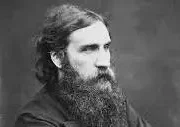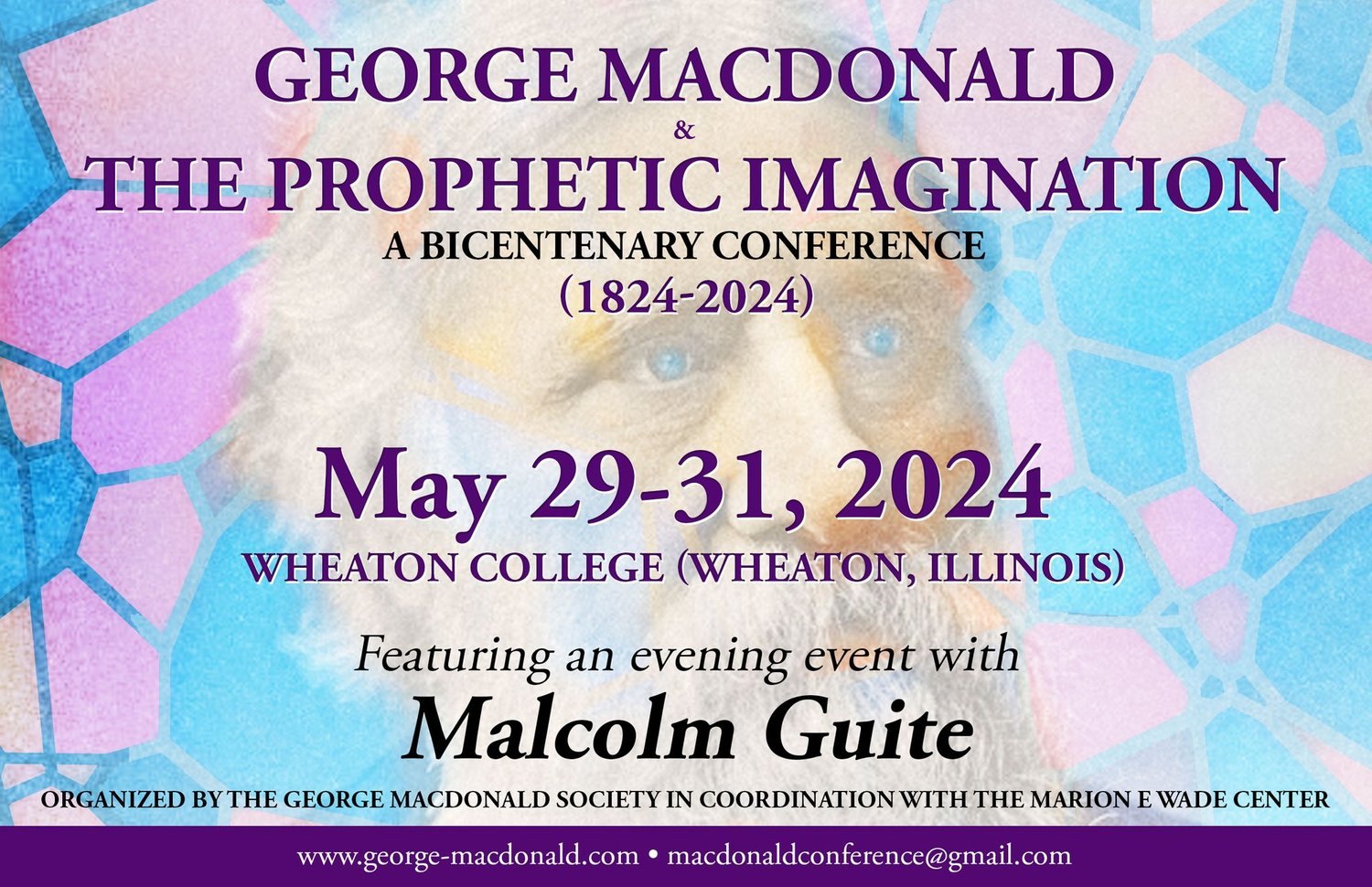
I will be offering a presentation at the upcoming “George MacDonald Bicentenary Conference 2024,” which is being organized by the George MacDonald Society in conjunction with the Wade Center at Wheaton College. I am not one of the keynote speakers, but I am delighted to be presenting a paper as part of a panel with John McNeil and Sharin Schroader. My father, Michael Phillips, will also be presenting a paper, focusing on how MacDonald used imagination to illuminate God’s higher purposes.
As with my earlier work on MacDonald, I am keenly interested in his doctrine of imagination. While my previous work has focused on MacDonald and the sacramental imagination and his views on beauty, this year I have found myself intrigued by how MacDonald is situated within the larger Victorian milieu, and areas of continuity and discontinuity between the 19th century doctrine of imagination and ancient thought.
On first glance, the Victorian redemption of imagination seems to be discontinuous with much of ancient Christian thought. Consider that many ancient Christian teachers take it for granted that fantasy is spiritually harmful. Though the ancients certainly appreciated fantasy literature in myths and epic poems, personal imagination in its dreamlike and fantastic aspect was often associated with the darker spirits. Greek Christian thinkers used a variety of words that preceded the English “fantasy,” including the following:

By the time of Victorians like George MacDonald, personal imagination as well as dream-like fantasy had ceased being wholly associated with temptation but was viewed as a potential source of high spiritual elevation. The phantasmic imagination was increasingly seen as a resource for faith. . For C.S. Lewis, MacDonald’s novel Phantastes baptized his imagination, not in spite of its dream-like quality, but because of it. This appropriation of the fantastical for spiritual ends is encapsulated in the term “prophetic imagination.”
This redemption of imagination did not spring up ex nihilo in the Victorian period but had antecedents in the medieval, early modern, and Romantic periods. Yet what begins to occur at the time of MacDonald is a more direct and self-conscious appropriation of the imagination as a spiritual resource. We see this in the way the concept of the “prophetic imagination” (the topic of the upcoming conference) comes to connote the way products and activities of personal imagination—including imagination in its fantastical and dream-like aspect—can have an inspired quality that speaks to us and our world in ways that are especially insightful, visionary, and spiritual. MacDonald was certainly a practitioner of the prophetic imagination in this sense. But he was also a theoretician and apologist for using and conceptualizing the imagination in this way. In his essays on the imagination, as well as other places throughout his corpus, MacDonald articulated a doctrine of imagination which positions it as an elevating and moralizing force. The imagination can order our affections rightly, inspiring us to good works in a way that pure moralizing never can. Moreover, the prophetic imagination offers us a way of knowing more deeply than the knowledge obtained through science, enabling us to achieve what MacDonald called, “an inward oneness with the laws of the universe that it possesses in itself an insight into the very nature of things.”
Though MacDonald’s doctrine on the spiritual imagination has received much attention in MacD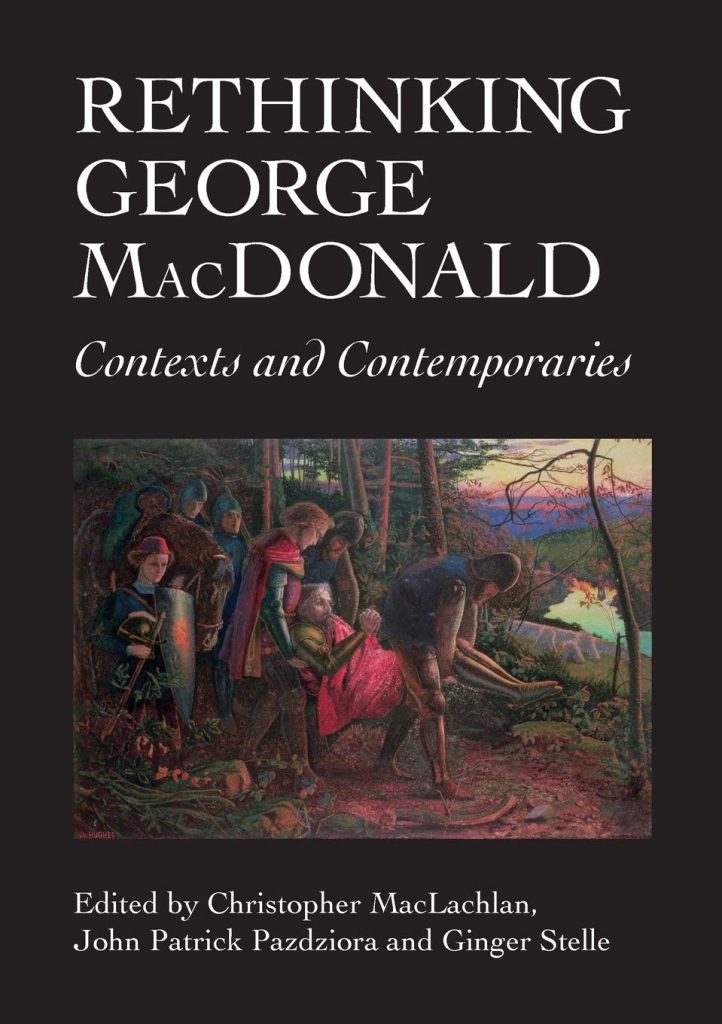
Certainly MacDonald was a creative genius, yet his genius can be seen in his ability to bring the thought structures of his time to a point of new clarity and synthesis. This is nowhere more evident than in his work on the prophetic quality of imagination.
This emphasis on the prophetic imagination arose in response to socio-economic factors in Victorian England. Consider that MacDonald’s famous line about imagination opening up “an inward oneness with the laws of the universe” was penned when interacting with an imaginary objector who dismissed the imagination as irrelevant on the grounds that it has nothing to do with science, which is governed by fixed laws. The hypothetical interlocutor in MacDonald’s 1867 essay asks, “But how can the imagination have anything to do with science? That region, at least, is governed by fixed laws.” MacDonald’s response is that through the imagination we can penetrate to the secrets behind the laws of science, and come to a deeper understanding of reality. Though deeply interested in science himself, this hypothetical dialogue (especially when seen in the context of the entire essay) suggests that MacDonald felt the pressure of a type of scientific reductionism that would later reach fruition in 20th century scientism. A sterile reductionism had many expressions in Victorian England beyond the nascent scientism, ranging from the rationalism embodied in the character of Mr. Gradgrind in Dickens’ Hard Times, to the mechanical logic of industrial society and the dehumanizing routines of the factory. Against these reductionistic trends, Victorian thinkers like MacDonald looked to imagination, like the innocence of childhood, as offering an antidote. The imagination provided, not an escape from the real world, but a type of higher vision that allowed one to grasp more deeply the true nature of reality. As MacDonald’s friend, the art critic John Ruskin put it, “the power of the imagination in exalting any visible object… [is], as it were, a spiritual or second sight.”
MacDonald and Ruskin were not alone, being part of a groundswell of thought on “prophetic imagination.” This can be seen in Google’s ngram viewer, which shows how phrases have occurred over time in a certain corpus of books – in this case, books in the English language.
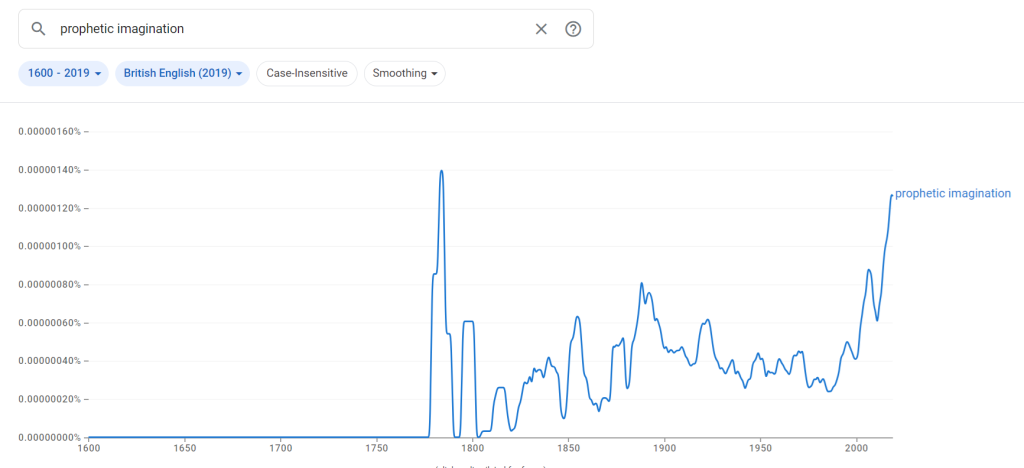
Another term that picks up at the time which was almost completely absent from English literature prior to 1818, is the term “spiritual imagination,” again peaking at the same period.
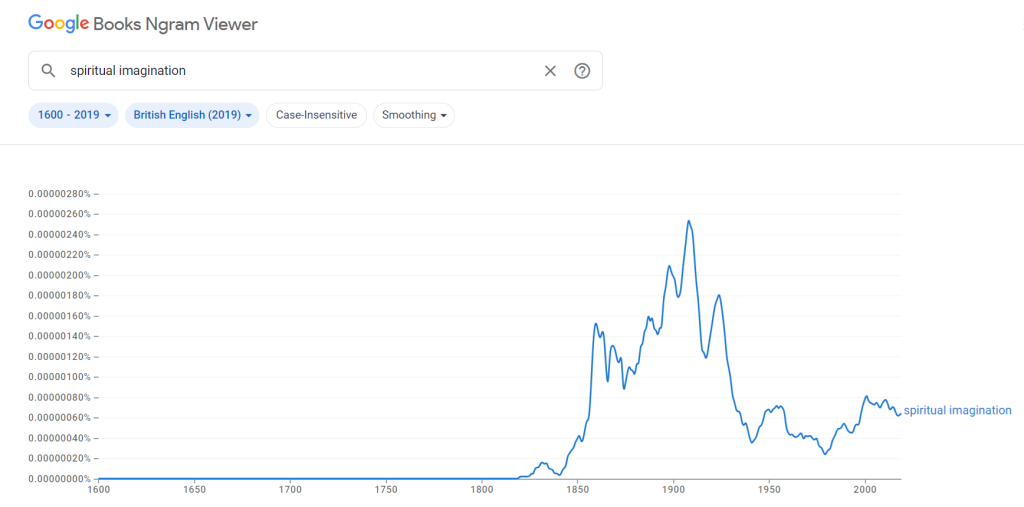
When we put “moral imagination” into the ngram viewer, we again find a significant rise in the second half of the 18th century, which roughly correlates with the pattern of “prophetic imagination” and “spiritual imagination.”
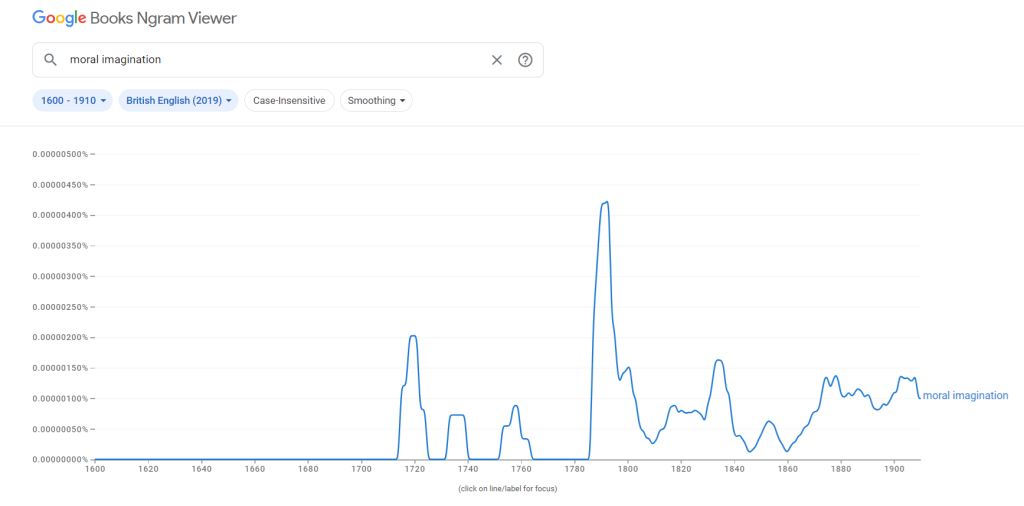
When the medieval schoolmen used the word [imagination], they meant the general power of image-reading: the shared human capacity to look at the world and render it as images in the mind. And when the Romantics used the word, they meant the specific power of image-making: the artist’s unique skill at forming an image in the mind and forcing it out on the world. For the old philosophers, the imagination was the ability to read the book of God’s creation. For the new artists, the imagination was the ability to become like gods and write the book themselves.
In neither case, however, does the word “moral” go easily with the word “imagination.” As well speak of moral eye sockets and moral ear drums, for the medievals. As well speak of moral thunder and moral hurricanes, for the Romantics. ”
Though the “moral imagination,” like spiritual and prophetic imagination, might have struck many as an anachronism, Burke made the concept a centerpiece of his ethics and political philosophy. His “wardrobe of moral imagination” responds to the reductionism of the French Enlightenment (what he called “the conquering empire of light and reason”) but also against the wild fantasies of those who would remake society according to the dictates of abstract reason. Where the term appeared in his Reflections, it functions much as “prophetic imagination” later would for MacDonald, namely a faculty of perception capable of recognizing structures of meaning not discernable to other modes of knowing. For Burke, imagination functions as a foil against grand systems of abstract reason that formed the basis of political utopianism, in much the same way as “prophetic imagination” functioned in MacDonald’s 1867 essay as a foil against reductionistic scientism. In both cases, the imagination is claimed from the realm of temptation and repositioned as central to the spiritual life, even to ethics.
While this redemption of imagination may seem like a unique development in the late 18th and 19th century—perhaps even a break from the more pessimistic approaches represented by the Greek tradition—I will use my upcoming presentation to make the case that the concept of the prophetic/spiritual/moral imagination is not without ancient pedigree. My argument will be that George MacDonald’s genius lies in his ability to draw on and reinvent concepts from classical and Christian antiquity that were not previously incorporated into the doctrine of imagination and even sometimes perceived in tension with it. But that is as much of a spoiler as I’m prepared to give for my upcoming presentation.
I will be posting more about George MacDonald in the coming weeks, including information about an exciting and groundbreaking project I’ve been doing with my dad to bring to light and clarify one of the abiding mysteries in MacDonald scholarship and bibliographic chronology. But for now, I’ll leave you with a video of the last time I spoke about MacDonald, where I explored the theme of gratitude through the lens of his life and thought.


